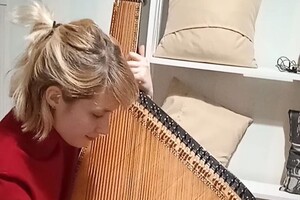The girl survived the bombing, occupation and filtration.

17-year-old bandura player Maria Vdovychenko until recently together with her family lived in Mariupol. Her life suddenly changed on February 24. Maria told hromadske the story of her family.
Mariupol – war
“On February 24 at 3:50 my mother heard the first explosion, ran to us with my younger sister into the room and said aloud the worst words: “The war has begun. We're going! “Then the real horror began. People ran out of houses, tried to buy everything, withdraw cash, refuel cars. And there were explosions all around, ”Maria said.
The girl's family was hiding in the bathroom of their own apartment. The windows were curtained and reinforced with paralon. According to Maria, there were days when they already knew what time they would fire.
“One morning, I don't remember exactly what number, we were all lying in the same room. We heard everyone walking around the apartment, something falling in the next room. But we were lying and thinking: no, it's far away, we're not We began to vibrate the ground, the house seemed to bounce. We quickly locked ourselves in the bathroom. At first there was such silence, it seemed as if something was falling, and then the blast wave broke all the way down. roof, glass was flying. They were shouting everywhere, “the young bandura player recalls.
Mariupol is a basement
After that, they had to move to the basement, where their neighbors already lived. There was nothing to cook, water was extracted from ice and snow. But the world outside the basement remained very dangerous – fragments, pieces of buildings, stones flew. One day a mine flew into the basement door.
An additional test was that Maria's mother has been suffering from polyneuropathy for six years. Against the background of stress, she stopped walking, her heart stopped twice.
“My father resuscitated his mother as best he could – artificial respiration, heart massage. Pills had to be sought under fire.”
For 12 days the family sat in the basement, where they constantly tried to evict someone and where they constantly quarreled.
“Usually the shelling started at about four in the morning. Then there was a short break, and at 10 – again. But that day everyone woke up to an unprecedented noise at two in the morning. We lay and tried to fall asleep. A cup on a shelf above me. The sound was as if I were lying and four trains were passing by me on each side. Usually, when they fired, a child cried, someone read the prayer aloud. And this time everyone was silent, “the girl's memories are terrifying.
Once a father told his family, “Either we die of starvation, or we fall asleep, or we are just killed.” Russian soldiers walked through the basements, checked who was sitting there, dropped bombs. One day they heard from neighbors that they could go to Melekino. My dad had an old Zhiguli, broken from buildings and glass. The car miraculously moved and drove under fire and hail almost to Melekino, where there was a post of “DNR”.
Yalta – occupation
“We were stopped at a checkpoint, asked the place of registration.” Mariupol? To your right. We didn't know what “right” was. From there we were directed further and further. So gradually formed a large column of cars and even people walking. Subsequently, the DNR military said to go “down”. We moved, and they just shot at cars and people. “
So the girl's family moved to Yalta (Donetsk region), where they hid for more than 10 days in an old boarding house. They had no food, water was taken from a well. In Yalta, they changed the government to the DNR, and they allegedly tried to show themselves on the good side. They were invited to come to them, to give their name, surname, in order to receive humanitarian aid. People went to survive, not to starve. But no rations were given there – they were received by locals, who sold them at the market at space prices.
“In Yalta, there were also several shops that imported products from Russia. Prices are high, the queues are huge. With the money we had, we were able to buy only two loaves of bread. We saved them, hid them so as not to take away.” Even then in Yalta there was a “denationalization”: soldiers went from house to house, looking for “nationalists”, “fascists”, as they say there. People were taken away in unknown directions, someone was killed.
Mangush – filtration
The family was filtered in Mangush. There were two camps. The first – for people who walked. They could be filtered for more than a month. And another camp was for those who are cars. It was not a settlement, but just a convoy of cars, which were forbidden to go out for food, water or toilets. They waited in line for two days.
Here's how the filtering works: they have a checkpoint. There comes a car, where they check every pocket, glove compartment, trunk, every bag. People have clothes and what's under them. Men are undressed on the street near cars. Looking for tattoos, some labels.
It happened that not all passengers from the car were filtered: they could pick up their father or mother, and the car had to move on.
“Our turn came at 11 pm, we were the last car that day. We were launched, searched. My mother did not go because of her illness. She and her sister were allowed not to leave: they said that” filtration begins at age 14, “she recalls. But Maria and her father had to go through filtration activities, she was sent to one filtration room and her father to another.
They took my fingerprints, scanned my documents, checked my phone. They asked provocative questions. About the government, Ukraine, about my own positions. They tried to find people who love their homeland, who wanted to live normally. They mocked, humiliated, could call out, were “. The girl's father was also beaten, he could barely stand on his feet.
“My father pressed the gas, and we set off. There was no direct road to Berdyansk: the bridge was blown up, so we drove around the neighborhoods, villages. We saw corpses, broken equipment. On the way my father began to have vision problems – he did not see “.
As it turned out, seeing that the girl's father had an “empty” phone, they started pushing and pushing him. At one point he was hit on the head – he did not remember how or what.
“Since that beating, my father lost his sight, and we still had to go further. Everyone was checked for documents, car, asked if it was filtered. People were deprived of food, warm clothes, asked for cigarettes, even asked about drugs and alcohol. “
Walnut – freedom
When the family arrived in Orikhovo (Zaporizhzhya region), it felt like it was getting easier to breathe, and then we saw the Ukrainian flag ahead.
“At first we were scared: is it a provocation? Is this another exam we have to pass? We were stopped. They say:” Good afternoon! Please show the documents. “We showed, although we were still convinced that it was a provocation. We are told:” Do not be afraid. This is Ukraine. “
The girl remembers that then they started crying. They could not believe that they had found their land under protection. Volunteers helped to get to the Dnieper. The father was examined by two doctors, who concluded that he had an injury due to a concussion. In one eye – complete loss of vision, and the other sees as if through a cellophane bag. “
” We can't lose our father. He saved us, now we have to help him, “Maria's mother, Natalia Serhiivna, added at the end of the conversation with journalists.
Earlier it was reported that the Russian occupiers deported almost 140,000 people from Mariupol. What Russia presents as an evacuation is in fact a forced deportation and abduction of Ukrainians. About 30,000 Ukrainians are being held in “filtration camps.”
Russia is trying not to repeat the failure in eastern Ukraine. In Zaporizhia oblast, 155 cases of abduction of civilians by the occupiers have already been recorded 69 civilians are still in captivity. The General Staff of the Armed Forces of Ukraine notes signs of the beginning of the Russian military offensive in eastern Ukraine The occupiers intensified offensive and assault operations in the Slobozhansky and Donetsk areas. Italy has decided to hand over weapons to Ukraine The problem of weapons is serious and Italy does not underestimate it. Threat to Kyiv eliminated – Zaluzhny He called not to ignore air alarm signals.


